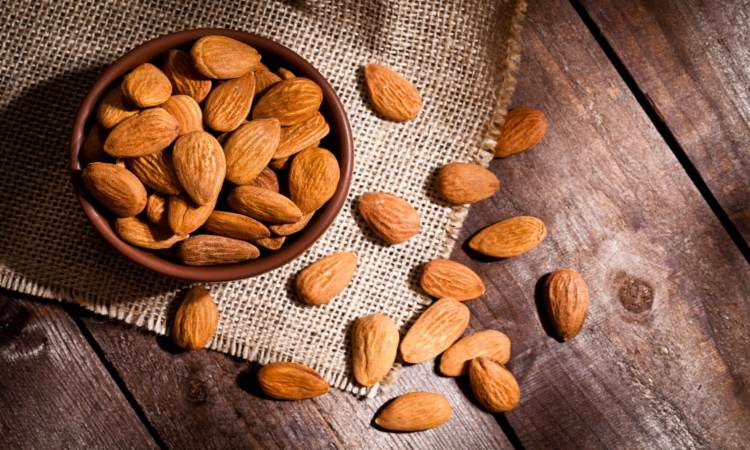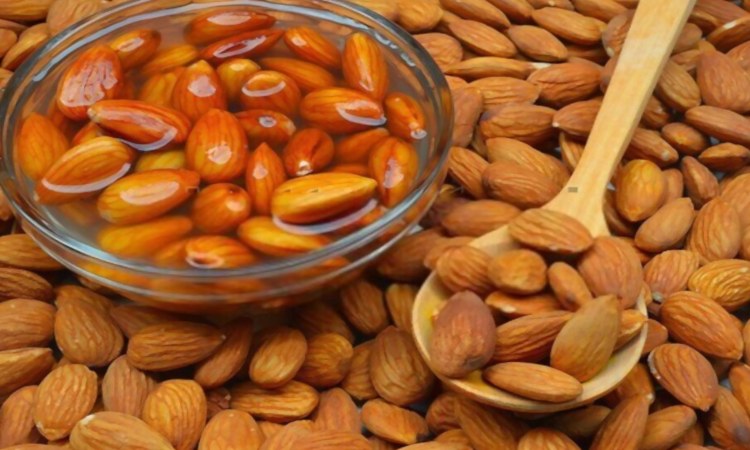We all know that almonds are highly nutritious but now that you are expecting, you might be wondering if almonds during pregnancy are safe.
Making healthy food choices is very important during pregnancy. During this phase, the body needs extra nutrients to support the life growing inside.
Almonds, or badam, also known as the “king of nuts” contain important vitamins essential fats, and proteins that are essential for the healthy growth of a fetus.
Is It Safe To Eat Almonds During Pregnancy?
If consumed in moderation with some precautions, almonds during pregnancy are not only safe but also beneficial. The only reason that makes eating almonds during pregnancy unsafe is if the mother is allergic to nuts.
In that case, it is important to get the doctor’s approval before adding them to the pregnancy diet. However, if the mother has developed no allergic reaction to almonds before pregnancy, the chances are very rare to develop one during pregnancy.
Nutritional Value Of Almonds
Almonds fall under the superfood category as they are a rich source of vitamins, minerals, proteins, and fiber. A hundred grams of this tree nut carries 64% daily required fat. Similarly, it carries 46% and 42 % of daily required fiber and protein respectively.
Almonds contain 115% of daily required copper. They are an incredible source of Vitamin E (114%). They also provides 95% of daily required manganese and 88% of daily required Vitamin B2.
Nutritional Benefits Of Eating Almonds During Pregnancy

Almonds (raw, soaked, or roasted) carry vitamins and minerals that are imperative for the growth and development of the baby in the womb. They also help the mother to combat many common pregnancy issues.
Calculate Due Date With LMP
Nutritional benefits of almonds during pregnancy include, though not limited to-
1. Almonds during pregnancy can prevent neural tube defects in babies
Almonds are rich in folic acid and Riboflavin (vitamin B2). Both are highly beneficial for the development of the brain and nervous system of the unborn baby. Folic acid is very important to guards the baby from neural tube defects.
2. Help with fetal weight gain
The protein content in almond is beneficial for the mother in terms of providing strength and enhancing stamina for the delivery. Riboflavin in almonds helps with the muscle and bone development of the baby.
Moreover, those 23 almonds carry 75mg of calcium. Calcium promotes the bone development of the baby. Manganese in almonds also aids in bone development. Therefore, almonds during pregnancy help with fetal weight gain.
3. Enhance metabolism
Mothers need to boost their metabolism during pregnancy. Low metabolism increases the chances of unhealthy weight gain and diabetes. Both are not favorable for the healthy progression of pregnancy and healthy growth of the fetus.
Almonds contain manganese, carbs, and dietary fat that promotes metabolism. Manganese also helps to regulate thyroid function and to maintain the blood sugar level.
4. Prevent excessive weight gain

According to studies, almonds can potentially prevent excessive weight gain. Pregnancy is the time of hunger pangs, food cravings, and weight gain. Almonds help to beat the hunger pangs by keeping the mother full for a longer time. This prevents unnecessary weight gain.
5. Almonds during pregnancy can help to beat anemia
Almonds are rich in iron. Iron requirement elevates during pregnancy. This is because, during pregnancy, the blood volume increases by around 50%. Inadequate intake of iron increases the risk of anemia.
Adequate intake of almonds during pregnancy can ensure 6% of daily required iron. This helps to beat anemia and health issues associated with it. Thus, almonds benefits during pregnancy incredibly.
6. Protects the baby from future allergies
According to research, maternal tree nut consumption during pregnancy lowers the risk of future nut allergies in the babies. Therefore, consuming a safe proportion of almonds brings down the possibility of allergic reactions like asthma or any other respiratory issues after birth.
7. Fiber stimulates digestion
Almonds are rich in fiber. It is very beneficial for regulating bowel movements. Constipation is a common issue many women faces during pregnancy. Eating almonds during pregnancy helps to combat constipation and other digestive issues.
8. Reduce the risk of preeclampsia
Adequate daily intake of almonds (1/3rd cup) provides around 75mg of calcium. Besides helping with the bone development of the baby and restoring the calcium leached from the mother’s bones, sufficient intake of calcium brings down the risk of preeclampsia.
Owing to the above-mentioned health benefits, consume up to 23 almonds on daily basis. The best time to eat nuts during pregnancy, including almonds are morning and evening. You can also have it as a mid-meal snack. Eating almonds first thing in the morning can boost your energy levels.
Are There Any Side Effects Of Eating Almonds During Pregnancy?
Despite the above-mentioned advantages, if consumed in excess almonds during pregnancy can bring about many health issues.
Side effects of overconsumption of almonds during pregnancy include:
1. Constipation and bloating

Almonds are rich in fiber. Excessive fiber intake on daily basis can adversely affect digestion. If almond consumption exceeds the daily intake limit, it can bring about constipation and bloating.
2. Vitamin E Overdose
Almonds are an amazing source of vitamin E. 1/3rd cup (or 23 almonds) of almonds (which is the daily intake limit) offers around 48% of the daily needed vitamin E. At the same time, other unavoidable members of the pregnancy diet like leafy greens and fruits are also loaded with vitamin E.
If exceed the limits, vitamin E consumption can lead to a condition called vitamin E poisoning. Usually, it is characterized by headaches, flatulence, blurred vision, abdominal pain, and diarrhea. In extreme cases (though very rare) it can end up in premature rupture of the amniotic sac.
3. Excessive intake can cause weight gain
The fat and calorie content of the almonds are high. The majority of the fats in almonds are monosaturated, which is beneficial for the heart. Still, excessive consumption can pave the way to unhealthy weight gain, especially if coupled with less physical activities.
Excessive weight gain during pregnancy can trigger many annoying health issues.
4. Can interact with medications
Almonds are a rich source of manganese. 1/3rd cup of almonds contains manganese that covers the upper limit of the daily requirement. Besides other food that is included in pregnancy diet like green leafy vegetables, whole grains, etc, also have their share of manganese.
Manganese is very important for the body. But, if the consumption exceeds the limit, manganese can potentially interact with medications for laxatives, antibiotics, and medication for blood pressure.
5. May impede nutrient absorption
Almonds are rich in fiber. Fibers tend to bind with other minerals in the food. Thus, it will interfere with the assimilation of minerals from the food to the bloodstream. Excess consumption of almonds, thus, impedes nutrient absorption.
Anything that impedes nutrient absorption should be avoided during pregnancy. The growth and development of the fetus are fully dependent on the mother’s nutrition.
6. Allergic reactions

Overconsumption of any food can trigger an allergic reaction. Almonds are not an exception. Excessive intake of almonds can trigger allergic reactions. This usually happens if you consume almonds excessively at a single go, or consume the nut without moderation over a prolonged period of time.
The allergic reaction can cause itching, rashes, mild breathing issues, or nausea. However, even though rare, in extreme cases it can trigger shortness of breath, shoot up blood sugar levels.
7. Kidney stones
Kidney stones occur as a result of a high level of calcium oxalate that formed inside the body fails to get eliminated. Almonds are rich in oxalates. When compared to other food sources, oxalates from the nuts are easily absorbed by the body.
Therefore, if exceed the moderation benchmark, almonds can trigger kidney stone issues. If you have a history of kidney stone or is prone to kidney issues, it is better to consult a doctor before incorporating any nuts in your pregnancy diet.
What Precautions Should You Take While Eating Almonds During Pregnancy?
- Always buy almonds from a trusted brand.
- If you can afford, choose organic almonds
- Ask your doctor before adding almonds to your pregnancy diet.
- Stay away from almond varieties like sugar-coated, salt coated, or chocolate-coated almonds. Instead, stick on to natural almonds.
Which Is More Beneficial? Soaked Almonds Or Raw Almonds?

Both raw and soaked almonds are equally beneficial in the nutritional aspect. However, when it comes to pregnancy, soaked almonds are considered to be a healthier option. Almonds soaked in water during pregnancy helps with digestion.
This is because the enzymes aids in digestion will be released when the almond is soaked in water. The skin of raw almond contains a compound called tannin. This compound keeps the nutrients locked inside this tree nut. Once the almond is soaked and the skin is peeled, these nutrients will beset free.
Let’s see why soaked almonds during pregnancy are said to be more beneficial than raw almonds
1. Soaking disintegrates phytic acid
Phytic acid is a substance that is present in tree nuts. Its role is to improve the life and quality of the nuts. However, the main disadvantage of phytic acid is it slows down the absorption of essential minerals and nutrients. This can bring about the mineral deficiency.
But when the almonds are soaked overnight, the outer brown layer that holds phytic acid is removed. As a result, other mineral-like phosphorous that stays underneath it is released. Phosphorous is beneficial during pregnancy in many aspects. Therefore raw almonds during pregnancy are not as beneficial as soaked almonds.
2. Soaking almonds deactivates enzyme inhibitors
Raw almonds contain some enzyme inhibitors. When you soak almonds with some salts, these enzyme inhibitors will be neutralized, and facilitate the digestion process. Along with deactivating enzyme inhibitors, soaking the almonds increases the bioavailability of vitamins in them.
3. Soaking makes almond tastier.

Almonds contain tannin that gives this tree nut its yellowish color. Tannin also has a bitter taste. Tannin is water-soluble and by soaking the almonds tannin will be removed. This makes the nuts taste sweeter.
How To Add Almonds To Your Pregnancy Diet?
Roasted almonds during pregnancy will help to curb the hunger pangs. Almond milk during pregnancy, even though is not as beneficial as cow’s milk, provides many nutrients. You can also add it to salads, cereals, porridge, etc, or simply eat almonds that are soaked and peeled.
What happens if we eat almonds daily?
Almonds are loaded with minerals, vitamins, and proteins. Eating soaked almonds on an empty stomach helps to boost and sustain your energy levels throughout the day. It increases our stamina. Eating 4-6 almonds every morning helps to enhance our memory.

